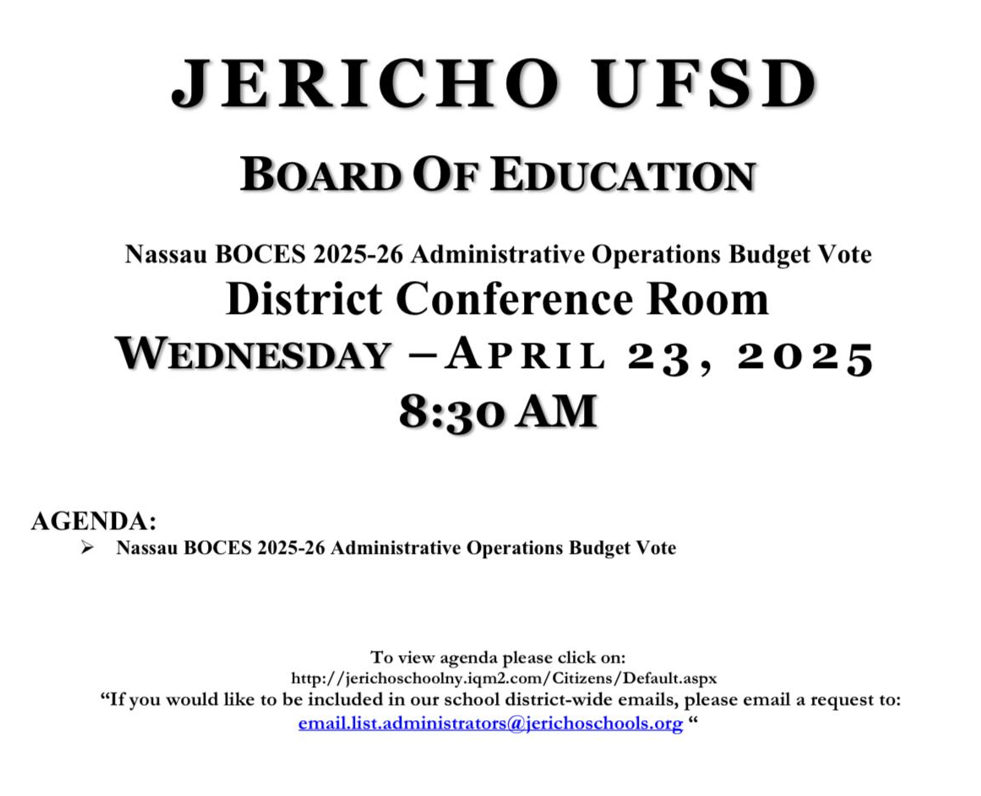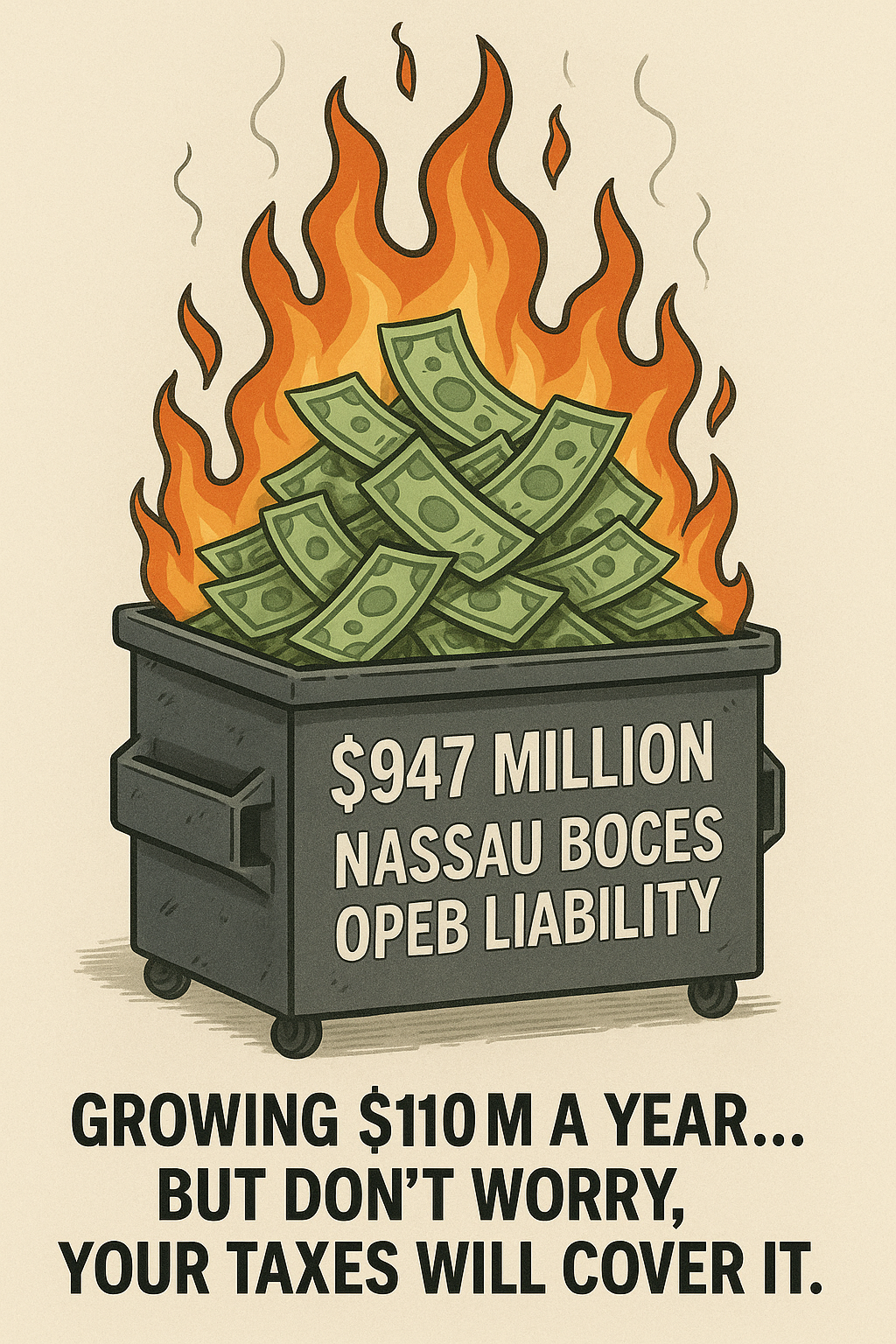At 7:30 PM on April 23, 2025, the Jericho Board of Education convened for a special meeting with one agenda item: approving Nassau BOCES’ $27.9 million administrative budget for the coming year.
The entire meeting lasted 65 seconds.

The Process by Design
“Hope everybody’s doing well,” the board president began casually. “Again, uh, this is a special meeting for the sole purpose to vote on the administrative operations budget for BOCES for the 25-26 year.”
After the Pledge of Allegiance, the president read the required motion approving Nassau BOCES’ budget “set forth in the attached.” A trustee moved, another seconded, and the motion was approved without discussion.
“Any discussion?” Silence. “All in favor?” “Aye.” “So carry.”
Total deliberation time: approximately 10 seconds.
What the System Doesn’t Encourage
The brevity wasn’t due to negligence—it reflects how the BOCES approval process is structured. District boards receive Nassau BOCES’ budget materials but operate under significant constraints:
Binary choice: Boards can only approve or reject the entire administrative budget, with no ability to modify specific line items or programs.
Regional pressure: With 53 of 56 districts typically approving, dissenting districts face isolation and potential service disruption.
Timing constraints: April approval deadlines leave little time for detailed analysis or coordination among districts.
The Information Gap
While the board had access to Nassau BOCES’ budget documents, the materials don’t highlight crucial long-term financial information:
The $946.7 million liability for retiree healthcare benefits that drives ongoing cost increases. The fact that $13.9 million of the administrative budget goes to current retirees rather than active educational programs. The structural factors that make future cost increases mathematically inevitable.
Board members operating within their regular responsibilities may not have the specialized knowledge to identify these deeper financial issues during routine budget approvals.
A Regional Pattern
This brief meeting represents the norm, not an exception. Across Nassau County’s 56 districts, similar special meetings approve the same budget with minimal discussion. The system produces consistent outcomes because it’s designed to do so.
Only three of five board members attended this $27.9 million decision, reflecting the routine nature these approvals have assumed.
The Democratic Deficit
The real issue isn’t individual board behavior but the gap between appearance and reality in local government oversight. Taxpayers expect their elected representatives to thoroughly review major expenditures, but the BOCES system creates conditions where such review is difficult to conduct effectively.
District boards focus primarily on local operations and may lack both the time and specialized expertise needed to analyze complex regional financial arrangements. Meanwhile, taxpayers assume comprehensive oversight is occurring.
You’re absolutely right – this timing sequence is crucial to understanding the democratic deficit in BOCES governance. Here’s the updated article section:
The Illusion of Democratic Control
The 65-second approval highlights a critical flaw in how Nassau County residents think local budget decisions work.
While Jericho’s BOCES costs were locked in during that brief April 23rd meeting, district taxpayers wouldn’t get to vote until nearly a month later. On May 20, 2025, Jericho residents overwhelmingly approved their district’s budget by a margin of 1,044 to 245 votes after a full day of voting from 6 AM to 9 PM at the MS/HS Gymnasium.
But that decisive vote was incomplete. By May 20th, millions in BOCES administrative costs, facilities rental fees, and debt service charges had already been committed through meetings like the April 23rd session – brief, sparsely attended, and concluded before meaningful scrutiny could occur.
The timeline reveals the problem:
- April 23: Three board members spend 65 seconds approving $27.9 million in BOCES administrative costs
- May 20: 1,289 residents spend 15 hours voting on a district budget that already includes those BOCES commitments
When Jericho taxpayers cast their ballots, they believed they were making a comprehensive decision about local spending. The reality is different: significant portions of their property tax burden had been predetermined through a regional process operating largely beyond direct voter influence.
This isn’t unique to Jericho. Across Nassau County’s 56 districts, the same pattern repeats: brief April meetings commit taxpayers to millions in regional costs, followed by May elections that create the appearance of comprehensive budget oversight while excluding some of the largest expenditures from voter control.
The system allows residents to vote on local programs, teacher contracts, and facility improvements, but removes their voice from regional commitments that may represent substantial portions of their tax bills.
The Structural Challenge
Nassau BOCES’ $567 million annual operation requires coordination among dozens of separate political entities, each with different priorities and constraints. The resulting system tends toward administrative efficiency rather than democratic deliberation.
This creates a fundamental tension: the cooperative model that makes BOCES operationally viable may inherently limit the kind of intensive oversight that large public expenditures normally receive.
The Accountability Question
The 65-second approval highlights a larger question about regional governance: How can democratic accountability be maintained when public services operate across multiple jurisdictions?
The current system may serve Nassau BOCES’ operational needs while inadvertently undermining the democratic oversight taxpayers expect. When taxpayers vote on their local school budgets in May, millions in BOCES costs have already been approved through meetings like this one—brief, routine, and concluded before meaningful scrutiny can occur.


